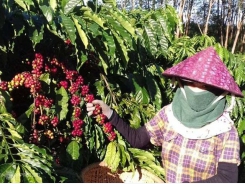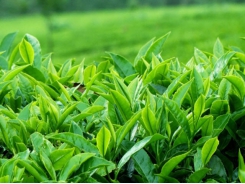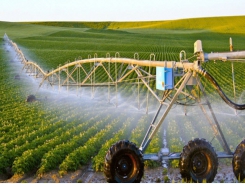Restoring fruit sector-key task of the Mekong Delta

Fruit sector is one of the three strengths of the Mekong Delta, so restoring and stabilizing it is an important task that localities within the region have been tackling.
Localities are implementing many measures to restore production and consumption of the fruit sector. Photo: Minh Dam.
Severe impacts of the COVID-19 pandemic
The impacts of the COVID-19 pandemic have recently posed many difficulties to the fruit and vegetable export sector in the Mekong Delta. Prices of most fruit products have decreased sharply and there were times that they could not be exported. Dragon fruit, longan, rambutan, coconut… are among those that have been seriously affected.
In Ben Tre province, the COVID-19 pandemic has exerted a big impact on the production and consumption of agricultural products, particularly during the implementation of social distancing measures according to Directive No. 16/CT-TTg of the Prime Minister. The drop in the price of a number of agricultural products and the slow consumption have directly affected the local production and consumption in all fields of cultivation, husbandry and fisheries.
In the field of horticulture, in the early stages of the implementation of social distancing measures, some agricultural products were congested, consumption was slow, which consequently extended the harvesting time, leading to reduced quality and crop health. Agricultural product prices are low compared to the same period last year due to difficulties in consumption.
Specifically, the price of green skin pomelo is from VND13,000 to 15,000/kg, Java rambutan from VND5,000-7,000/kg and longan from VND7,000-15,000/kg. Meanwhile, some local facilities that purchase drinking coconut and industrial coconut products have not yet guaranteed the "3 on-site" disease prevention model and the "5K" principle, so their consumption is limited.
Besides, difficulties in commuting to take care of the orchards and hiring laborers have also affected the growth and control of plant pests and diseases. Therefore, the productivity and output of agricultural products may decrease in the upcoming time.
Specifically, the pesticide spraying and parasitic bee release have been interrupted in coconut gardens infected with blackhead worms. The transportation of agricultural materials is difficult due to social distancing, so locals lack materials to supply crops. The high price of raw materials increases the farmers’ investment costs for production.
In 2021, the total planted fruit area in the Mekong Delta is estimated at 363,000hectares, an increase of 19,000 hectares compared to 2020. The fruits with largest cultivated area include mango at 49,000 hectares; banana 38,000ha; dragon fruit 26,000ha; pineapple 29,000ha; durian 25,000ha; jackfruit 30,000ha; lemon 27,000ha; oranges 36,000ha; pomelo 32,000ha; longan nearly 25,000 ha; rambutan 9,000ha; guava 8,000ha and star apple 4,000ha.
Supporting farmers to build specialized farming areas
In order to adapt to the new situation, ensure the dual goals of fighting the pandemic and developing the economy, localities in the Mekong Delta have implemented measures to restore production, particularly of the fruit sector.
According to Doan Van Danh, Director of the Department of Agriculture and Rural Development of Ben Tre province, the provincial Department of Agriculture and Rural Development has continued to implement the program of supporting farmers to build specialized agricultural production areas according to standards(GAP, organic, sustainability standards...).
Other measures include increasing the application of science and advanced technology; promoting organic agricultural production and clean agriculture through agricultural and fishery extension activities; granting codes of growing areas and farming areas that meet GAP and organic standards; strengthening management and supervision at the request of importing countries.
The department will also instruct and encourage locals, cooperatives and enterprises to promote, introduce and consume agricultural products on the e-commerce platform of Vietnam Post Corporation (postmart.vn) and Viettel Post Corporation (voso.vn), including ordinary products that are not OCOP one.
Besides, they will coordinate with relevant units to organize stable selling points and essential goods, help to connect communes in consuming agricultural products during the pandemic, particularly those with large output.
In Tra Vinh Province, Director of the Department of Agriculture and Rural Development, Pham Minh Truyen, informed that the department has developed and implemented a flexible production plan that adapts to the weather and is suitable to the market to achieve the growth target of the horticulture sector. Especially, the province has continued to adjust the structure of crops and products in line with market advantages and needs, and adapt to climate change.
At the same time, Tra Vinh provincial authorities have promoted the management of planting areas for export and expand markets for agricultural products; improve the capacity of monitoring, forecasting and controlling of organisms harmful to plants to proactively prevent new pests and diseases, while strictly controlling production and trading of fertilizers and pesticides, having specific plans to guideand encourage producers to use organic fertilizers and biological pesticides.
The focal point of the measures is maintaining a 143ha safe vegetable production area, fruit tree production in the direction of VietGap 407ha, expanding by 1,100haorganic coconut. By 2022, the total area of planting organic-certified coconut is expected to reach 2,394ha.
Connecting supply-demand chains
According to Nguyen Quynh Thien, Vice Chairman of Tra Vinh Provincial People's Committee, the province's specialty fruits such as durian, mangosteen, longan, ... have been introduced on e-commerce platforms (Shopee.vn, Sendo.vn,…) for consumption, which helps to avoid congestion.
The province focuses on building a well-connected supply-demand chain of agriculture - fishery between provinces and cities in the Mekong Delta and Ho Chi Minh City, which is one of the effective solutions to prevent the disruption of the agricultural product supply-consuming chains in the near future; thereby creating motivation to help businesses gradually stabilize production and business after the COVID-19 pandemic.
In the 2018 – 2020 period, Tra Vinh Province focused on supporting businesses to promote the consumption of agricultural and fishery products, with 15 product market linkages with other provinces and cities in the country. Thereby, 31 economic contracts were signed between provincial enterprises and those in other provinces and cities nationwide.
The province is currently focusing on directing all relevant units to review agro-fishery products that are and about to be harvested, actively link the consumption markets, diversify sales forms, focus on introducing products to wholesale markets, traditional markets, supermarkets, trade centers, especially promoting consumption through e-commerce platforms.
Specialty fruit products of Tra Vinh Province such as durian, mangosteen, longan,... have been posted on e-commerce platforms (Shopee.vn, Sendo.vn, Voso.vn, .. .) for consumption, thereby avoiding congestion to some extent.
Tien Giang prioritizes product links
According to the Tien Giang Department of Agriculture and Rural Development,the implementation of production linkage support is an effective step to improvethe sustainability of local products.
The People's Committee of Tien Giang province has issued Decision 2628 on thelist of important agricultural commodities and products that need to be promotedand prioritized to support the implementation of linking production with productconsumption in the province.
The key products in the list include rice, fruit trees, vegetables, livestock andaquatic products. Meanwhile, the key products of the fruit sector include mango, star fruit, durian, sapo, pineapple, dragon fruit, soursop, pomelo, orange, acerola, jackfruit, longan, rambutan, banana, lemon, guava, plum and coconut.
According to the general assessment of Tien Giang Department of Agriculture andRural Development, cultivating areas specialized in additional products in thepriority list to support production linkages have been formed, along withcooperatives in production areas to link product consumption with traders, businesses and currently dominating domestic markets.
Có thể bạn quan tâm
Phần mềm

Phối trộn thức ăn chăn nuôi

Pha dung dịch thủy canh

Định mức cho tôm ăn

Phối trộn phân bón NPK

Xác định tỷ lệ tôm sống

Chuyển đổi đơn vị phân bón

Xác định công suất sục khí

Chuyển đổi đơn vị tôm

Tính diện tích nhà kính

Tính thể tích ao hồ




 The qualitative transformation of Vietnam’s rice
The qualitative transformation of Vietnam’s rice  Smart agriculture development in urban areas
Smart agriculture development in urban areas